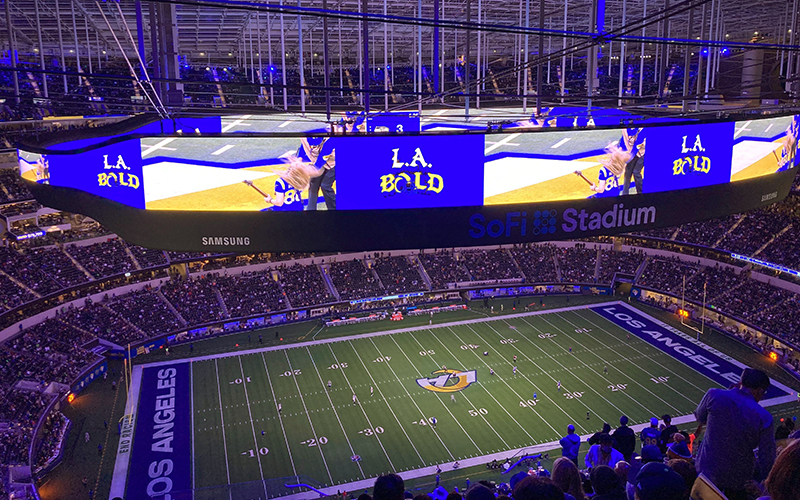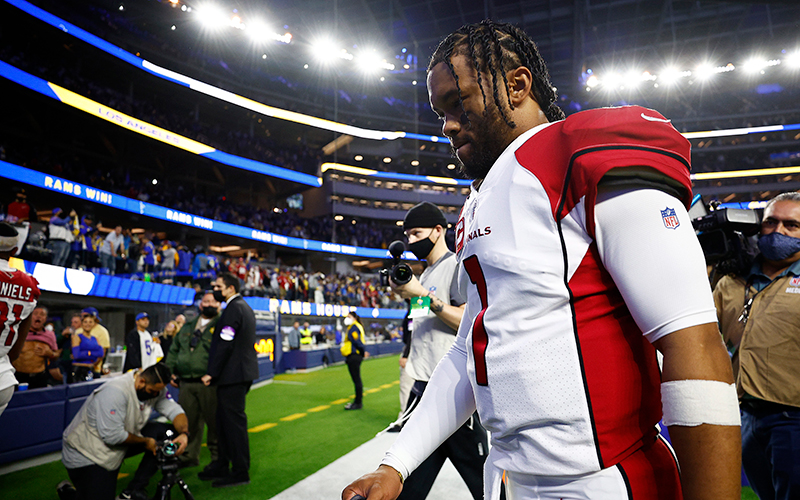
SoFi Stadium, the 70,240-seat home of the Los Angeles Rams, is sold out for Sunday’s NFC Championship game against the San Francisco 49ers. (Photo by Joey Vacca/Cronkite News)
LOS ANGELES – San Francisco 49ers fans were red this past Sunday. Not with team pride, but with rage at the Los Angeles Rams’ restrictive ticket policy ahead of Sunday’s NFC Championship game.
After winning their divisional round matchups last weekend, the 49ers and Rams have a date in SoFi Stadium with a trip to the Super Bowl at stake. But when eager San Francisco fans rushed to purchase tickets last Sunday, they got an unexpected message: Sales were limited to residents of greater Los Angeles, with ZIP codes to be verified at checkout.
It appears the Rams are already afraid that the 49ers will again make SoFi Stadium their home — they're trying to restrict ticket sales for a potential NFC title game by geography.
IMO pathetic and also premature — LA isn't even in the title game yet pic.twitter.com/G8VmbG9muv
— David Lombardi (@LombardiHimself) January 23, 2022
Although the restriction was lifted Monday, it seemed at first as if the Rams – who often have played in SoFi before throngs of fans cheering their opponents – were simply barring Bay Area residents from purchasing tickets.
That’s where the red came in: San Francisco players, fans and media alike shared their fury over the policy. The NorCal v. SoCal rivalry runs deep and across sports – witness the animosity between the Dodgers and Giants – and the Rams’ move was quickly chalked up as more “Beat L.A.” bulletin board material.
I get that we turned sofi stadium to Levi’s but restricting fan from buying tickets is kraxy to me….. IJS
— Deebo (@19problemz) January 24, 2022
This is really pathetic. If I were a RAMS fan, I'd be embarrassed. "Ticketmaster originally restricted sales of NFC Championship tickets to those w/ ZIP codes in Southern California, but the "Niner fan ticket ban" has since been removed. Now, 49er fans are coming in full force!" pic.twitter.com/5WHoSwhZEe
— Mark Ressa Attorney (@BayAreaDivorce) January 25, 2022
? Maybe just fill your own stadium? https://t.co/QJ3PzD1sFv
— Dustin Dorsey (@DustinABC7) January 24, 2022
The restriction was lifted 11 a.m. Monday, and the Rams’ public relations team later released a statement saying the 70,240-seat stadium is sold out: “Our season ticket members bought up all available tickets during a presale over the weekend, so there is no policy in place.”
Blaine Grisak, writer and managing editor of the East Coast-based website Downtown Rams, is a New Yorker and diehard Rams fan. He wouldn’t have been able to purchase tickets under the policy but said he wasn’t bothered.
Whatever the true intention behind the Rams’ move, Grisak said he liked it, adding that 49ers fans were making too big a deal of it. But he had no trouble pointing out why it created more of a controversy compared to ticket restrictions of the past.
“It’s L.A., it’s what’s going to generate clicks,” he said. “L.A. with a new stadium that has this stigma of being taken over by away fans – that’s going to generate the headlines. I can see why that’s getting more of the attention.”
It’s easy to see how the 49ers’ latest L.A. invasion, paired with San Francisco’s recent successes against the Rams, have stoked the flames of Niners fans.
The last time these teams faced off was in the 2021 regular season’s high-stakes final week, when the 49ers staged a season-saving, second-half comeback on the road, notching their sixth straight win over L.A. in the Rams’ shiny new stadium in front of thousands of 49ers fans.
That’s not a misprint. A multitude of the 49ers faithful made their presence felt last time in Inglewood. So much so that the Rams, unable to communicate over the raucous crowd noise, were forced to play with a silent count on their home turf.
In a column Tuesday morning, the San Francisco Chronicle’s Ann Killion called the Rams’ ticket policy embarrassing and a “bad, uncool look.”
In reality, though, these policies stretch far beyond this California intrastate rivalry. And as angry as fans may be, it isn’t an isolated instance. In fact, it’s not even an isolated instance in the NFL playoffs.
The Tennessee Titans prepared to host the Cincinnati Bengals in this year’s AFC divisional round for only their second home playoff game in the past 10 years. Ahead of the game, the team implemented a new ticket policy in which fans would not be able to transfer their purchased tickets until 24 hours before the game was set to kick off.
In an interview with Nashville’s News Channel 5, Brooke Ellenberger, the Titans’ vice president of ticketing, acknowledged that the team wanted to limit the number of Bengals fans in the stands.
Postseason ticket restrictions occur across the American sports landscape for many reasons.
The idea of ticket restrictions adding a competitive advantage in the playoffs has also been seen in the NBA and NHL. The 2021 Washington Wizards and 2015 Tampa Bay Lightning both limited first-round playoff tickets to locals only.
But for such teams as the 2013 Denver Broncos, ticket restrictions served to prioritize local fans when only a few playoff tickets were available after season ticket holders bought theirs.
Other teams, including the 2013 Seattle Seahawks and 2019 Dallas Stars, have restricted postseason tickets to limit large-scale purchases that get flipped in the secondary market through Ticketmaster or StubHub.
Whether the Rams’ move was to prioritize season ticket holders or find a competitive advantage, both are equally likely.
As for the impact the restriction has on the NFC Championship game, the results will speak for themselves on Sunday.

